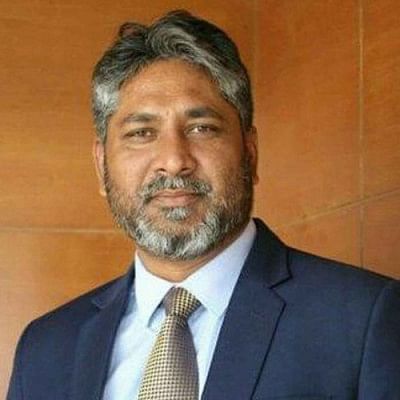Protecting Rights of Rivers: Turning intention into action
In February 2019, the High Court Division (HCD) of the Supreme Court of Bangladesh delivered a landmark decision granting all rivers with 'legal personhood,' declaring all rivers in Bangladesh to have legal protection. The core outcome of the verdict are 17 major directives for addressing river pollution and illegal riverbank development ('encroachment'). This includes barring polluters from running for office, legally empowering the National River Conservation Commission as the 'guardian' of all rivers, and excluding designated polluters from accessing bank loans. University of Oxford with the support of UK Research and Innovation Strategic Priorities Fund has undertaken a project for bi-lingual translation (English-Bangla) of the HCD verdict which was approved by Justice Ashraful Kamal of the High Court Division of the Supreme Court of Bangladesh last month.
Mohammad Golam Sarwar, Lecturer in Law, University of Dhaka worked as a consultant for University of Oxford to translate this verdict. On 11 November 2020, the bi-lingual English-Bangla translation of the said landmark judgment was launched. The event provided rich insights into the role of the verdict in shaping the institutional and legal landscape with major implications for industries. The discussion reflects on the significance of conservation of rivers in Bangladesh and around the globe. Here we publish a summary of the discussion.

Rebecca Peters, DPhil candidate, School of Geography and Environment, University of Oxford
A recurring theme in the past four years that I have worked in Dhaka is the idea that Bangladesh is a riverine country – 'nodi matrik', a country borne of her rivers. Yet despite government mandated requirements for industrial wastewater treatment with the Environmental Conservation Act since 1995 and mounting directives from clothing brands sourcing from Bangladeshi factories, water quality has worsened throughout the river system resulting in ecological harm and public health risks. As Bangladesh strives to deliver on national aspirations to accelerate industrialisation and attain the Sustainable Development Goals, government and industries contend with falling groundwater levels, domestic demand for pollution abatement, and uneven pressure for environmental compliance from international brands that source from Bangladesh-based factories.
This ongoing struggle suggests that law is not enough; a widespread commitment to enact law and practise rule of law is essential to turn words into reality. Every actor across government, industry, and society have a role to play in restoring and protecting river systems.

Mohammad Golam Sarwar, Lecturer, Department of Law, University of Dhaka
While translating the verdict, I have learned the significance of river from diverse perspectives including historical, economic, political, and cultural. The first part of the judgment describes the statement of the case that reveals the vicious cycle of river encroachment. The judgment narrates the origins of the rivers in Bangladesh and also addresses the euro-centric and oriental outlook on rivers. It also has a literary perspective that portrays the affinity of the people of Bangladesh with rivers and reminds us the connection of river with our very existence.
In addition to recognition of legal personhood to rivers, there is an indication of a legislative reform from the directives of the judgement. It declares river encroachment and river pollution as criminal offences, and recommends to impose strict penalties for the offences. So, there is a need for amendments or adopting a comprehensive law for rivers which would incorporate the issues laid down in the judgment as was done for the Whanganui River in New Zealand. Three issues to be addressed to tackle the implementation challenges of the verdict are: ensuring accountability of the stakeholders, ensuring access to environmental justice, and creating scopes for corporate environmental accountability.

Professor Robert Hope, University of Oxford, Director of the Water Security Initiative
The UK-FCDO funded REACH Water Programme works in partnership with governments and academic actors regarding river-water quality issues. It is a very complex hydrological system. There are multiple rivers that flow in multiple directions and it is often very difficult to understand the causes and consequences of water quality risks within the system. So, we have been working in cooperation to try and have a systemic understanding of those river-water quality risks and of the social implications of those who are under most risks to try and guide policy and interventions into the future. A key part of this is to try and understand who is interacting with the rivers and who is at most risks so we can take early and preventative action as many people have a close interaction with the river.

Saida Muna Tasneem, High Commissioner of Bangladesh to the United Kingdom
In India and New Zealand, this right has been provided to a few rivers and in Bangladesh, this has been done for all rivers. This is an extraordinary achievement and will go a long way in establishing jurisprudence in international law. Today is a historic time as yesterday, the US president elect has declared that it will be rejoining the Paris Agreement. The UK is also looking forward to an ambitious COP-26 and Prime Minister Boris Johnson has invited Prime Minister Sheikh Hasina to an ambition summit where leaders are expected to put forward very ambitious NDCs. Prime Minister Sheikh Hasina has recently assumed the presidency of the 48-member Climate Vulnerable Forum. This is a very important time as countries, especially G-20 countries must make ambitious declarations by midnight of December 31, 2020.
Our Prime Minister has been a great advocate of climate action and has inaugurated the Climate Adaptation Forum. She is also a member of the high-level panel on water of the UN Secretary-General. In 2018, she adopted the Bangladesh Water Rules. This historical verdict coincides with the political commitment of saving the rivers. Additionally, the penalties mentioned in the judgment are very stringent and can set an example for the rest of the world.

Justice Ashraful Kamal, High Court Division, Supreme Court of Bangladesh
It breaks my heart to see the deterioration of the condition of the rivers with which I had such fond memories. The Turag river judgment gave me the opportunity to redress some of the wrongs done to these rivers. While we cannot regain the past, but it is imperative that we save the planet from further destruction. Once upon a time, Bangladesh was home to over 1300 rivers but currently, it has only 405 rivers listed officially. The rest have dried up or been exploited to the point of no return. The remaining ones are prone to pollution and destruction. It is to be noted that this is a recurring issue throughout the world – the utopian laws have not stopped encroachers as they can bypass the laws. The judiciaries around the world have developed sophisticated jurisprudence and doctrines but they have failed as the policymakers, law enforcers and other stakeholders, the test of willingness.
We must remember that being blind will not prevent our destruction. It will only make us more vulnerable to it. Therefore, the 17 directions given in the judgment are essential to be adopted and implemented for the protection of the future generation.

Mahfuz Anam, Editor and Publisher, The Daily Star
We take great pride in the fact that The Daily Star has been writing on rivers relentlessly for the last several years. It has frustrated me immensely to see how the rivers have been neglected. I think media has a very important role and we consider ourselves very fortunate that one of our reports triggered the relevant stakeholders especially the judiciary to come up with this landmark judgment.
Over the years, the rights of rivers in the land has been shrunk. In addition, reckless permission has been given to locate industries on the banks of rivers. We have a strong legislative framework and government policies to address these issues but we are faltering in their implementation. So, it will be my earnest wish that the discussions in this seminar reaches the government actors and other stakeholders.

Sharif Jamil, General Secretary, BAPA
Co-ordination is essential for the proper implementation of the historic verdict on rivers. It has been rightly pointed out that the laws need to be implemented and that we must learn how to live with the rivers. However, it is unfortunate that development projects such as coal-based powerplants are being established on the banks of rivers and in areas of vast ecological importance such as the Sundarbans. The Delta Plan 2100 that has been undertaken reflects a commercial approach that does not adequately address environmental concerns. Therefore, without a holistic effort, the spirit of the verdict cannot be upheld through actions.

Advocate Manzill Murshid, President, Human Rights and Peace for Bangladesh
I was confident about the outcome of this case based on my experience of filing more than 300 public interest litigations. While filing this writ petition, I referred to the judgments in India and New Zealand where rivers had been granted legal rights. However, no such rights existed in Bangladesh. The credit goes to the Honorable Justices who delivered the verdict and particularly to the author Judge who eloquently enumerated the intricacies of our lives and the rivers in Bangladesh. We need to work together to find a permanent solution for the protection of the rivers for our future generations.

Dr. Erin O'Donnell, University of Melbourne, Water law expert
A combination of being both beloved and highly impacted by pollution is a unifying characteristic of all rivers that have been granted rights across jurisdictions. Granting of legal rights is like giving a voice to the rivers and this is a profound shift in the way that the rivers are viewed in the laws. But a voice is only useful when it has the power to be heard. So, rivers need to have the funding, support and organisational capacity to appear before a court of law and get their rights protected. This is an aspect where rivers struggle around the world – a process to ensure this needs long-term change and is an educative process. We need new ways of thinking and looking at rivers, but this cannot be done without community engagement that emphasises the intricate relationship between rivers and human beings.

Sharmeen Murshid, Member, National River Conservation Commission
The biggest challenge in implementing the court orders lies in the fact that those state institutions/duty bearers who are responsible for protecting the rivers (that is those whose compliance is most important) are the very actors destroying the rivers! During the last three years the NRCC, the guardian of the rivers as proclaimed by the court order, identified nearly 50,000 encroachers and polluters, of these nearly 90% are due to state/government structures!
The Commission, who is responsible to oversee compliance, has been hand and foot bound at birth to the Shipping ministry (under the 2013 act) whose interests in rivers is in direct conflict with the commission's mandate, thus offsetting the 'independence' of the Commission. The full implementation of Court Orders will be subject to the formation of an independent river commission under only the PM and the Cabinet and not under any ministry.
Recommendations:
- Actors across government, industry sector, and society need to play respective roles in restoring and protecting river systems.
- Comprehensive reforms in existing legal framework have to be brought about and new laws need to be adopted with a view to incorporating the key issues laid down in the HCD judgment.
- Stringent penalties for river encroachment and river pollution are to be put in place through appropriate legislation.
- The National River Conservation Commission (NRCC) requires adequate independence and support to play its supervisory and overseeing role.
- Accountability of all stakeholders needs to be ensured.
- Access to environmental justice needs to be realised.
- Corporate environmental accountability must be expanded.
- Community actors are to be engaged in order to raise awareness and emphasise the intricate relationship between rivers and human beings.
The event is covered by Tahseen Lubaba and Tanveer Ahmed Fahim, Students of Law, University of Dhaka.

 For all latest news, follow The Daily Star's Google News channel.
For all latest news, follow The Daily Star's Google News channel. 



Comments